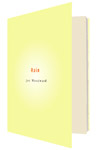Here’s a book you can read in half an hour; it could stay with you for years. Rain might be a set of short, sad, digressive, casual one-page poems, all in the same type of stanza: five lines of five words each. It might be a versediary. But it might be, instead, a book-length elegy for the author’s friend Patrick, dead—apparently— after his teens and before middle age. In these ways it resembles—it is a modern, miniature answer to— Alfred Lord Tennyson’s Victorian best seller In Memoriam (1850). Tennyson, tracking his own grief for his best friend, captured his contemporaries’ high seriousness and their fears that there might be no God. Woodward’s more modest work captures a zeitgeist too: it’s a poem of anxious, underemployed Gen-X-and-a-half-ers migrating to coastal cities, unsure of their wings, willingly distracted from whatever big plans they so diffidently assembled in more optimistic undergraduate days.
The ordinariness of life while grieving, the way everything goes on and yet can’t go on, gives Rain its strongest metaphors—“a glacier creeping forward,” for example: “will it // grind us in its works / and if it does will / it matter as much as / it feels like it will.” To see honestly how each day, each item, acquires meaning after such big loss, it’s important not to press too hard: “it’s going to rain I’m / going to go see Spider Man.”
Rain backs into its core of lament. Patrick doesn’t appear, by name or otherwise, until the seventh page: “Patrick and I sat at / the bus stop he was / only going to be in / town for a day.” When Patrick’s death, and Woodward’s mourning, emerge, they feel harrowing and unmistakable, like an alarm clock inside the poet that won’t stop going off: “it’s not that he died / it’s that he won’t stop / dying.” Woodward sees Patrick every time it rains (hence the book’s title); he visits a whaling town and sees tombs in the sea.
Woodward swivels easily from plainspoken dailiness to rhetorical heights: “look it’s raining again we / needed another skin O come / be slender and true inside / the cemetery with me.” His stanzas come off not as terse but as gently reticent, sure to say no more than he wants to mean. The lack of punctuation (with its implicit hush, its breathlessness) helps. So do the five-by-five grids: made of words rather than syllables, they let lines get much longer, then much shorter, for drama and pace. They also let Woodward surprise us with the occasional blank line, or line with fewer than five words: such lines leave something out, or end too soon, like the life they hope to commemorate.
Rain has six multi-page sections, each with its own topic above and beyond Patrick’s death. One section remembers a visit to Gloucester, Mass.; another invokes the prophet Ezekiel, known for his vision of a valley of dry bones. Woodward finds that prophet “down the world’s largest hand / dug well,” “building a tiny ship inside a bottle.” Ezekiel is making small, perhaps futile, nostalgic artworks, rather like Woodward himself. Three pages, or poems, within the Ezekiel section repeat an opening phrase: “only half of the house / was haunted.” The house, like Woodward’s soul, keeps quotidian things—“the non / haunted half,” a four-bladed ceiling fan, “a / bra draped over a closet door”—uncomfortably juxtaposed, oddly familiar, always close to a persistent ghost.





